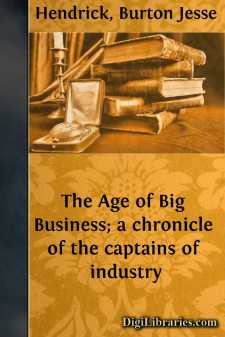Categories
- Antiques & Collectibles 13
- Architecture 36
- Art 48
- Bibles 22
- Biography & Autobiography 813
- Body, Mind & Spirit 142
- Business & Economics 28
- Children's Books 14
- Children's Fiction 11
- Computers 4
- Cooking 94
- Crafts & Hobbies 4
- Drama 346
- Education 46
- Family & Relationships 57
- Fiction 11829
- Games 19
- Gardening 17
- Health & Fitness 34
- History 1377
- House & Home 1
- Humor 147
- Juvenile Fiction 1873
- Juvenile Nonfiction 202
- Language Arts & Disciplines 88
- Law 16
- Literary Collections 686
- Literary Criticism 179
- Mathematics 13
- Medical 41
- Music 40
- Nature 179
- Non-Classifiable 1768
- Performing Arts 7
- Periodicals 1453
- Philosophy 64
- Photography 2
- Poetry 896
- Political Science 203
- Psychology 42
- Reference 154
- Religion 513
- Science 126
- Self-Help 84
- Social Science 81
- Sports & Recreation 34
- Study Aids 3
- Technology & Engineering 59
- Transportation 23
- Travel 463
- True Crime 29
The Life and Letters of Walter H. Page, Volume II
Categories:
Description:
Excerpt
CHAPTER XIV
THE "LUSITANIA"—AND AFTER
The news of the Lusitania was received at the American Embassy at four o'clock on the afternoon of May 7, 1915. At that time preparations were under way for a dinner in honour of Colonel and Mrs. House; the first Lusitania announcement declared that only the ship itself had been destroyed and that all the passengers and members of the crew had been saved; there was, therefore, no good reason for abandoning this dinner.
At about seven o'clock, the Ambassador came home; his manner showed that something extraordinary had taken place; there were no outward signs of emotion, but he was very serious. The first news, he now informed Mrs. Page, had been a mistake; more than one thousand men, women, and children had lost their lives, and more than one hundred of these were American citizens. It was too late to postpone the dinner but that affair was one of the most tragic in the social history of London. The Ambassador was constantly receiving bulletins from his Chancery, and these, as quickly as they were received, he read to his guests. His voice was quiet and subdued; there were no indications of excitement in his manner or in that of his friends, and hardly of suppressed emotion. The atmosphere was rather that of dumb stupefaction. The news seemed to have dulled everyone's capacity for thought and even for feeling. If any one spoke, it was in whispers. Afterward, in the drawing room, this same mental state was the prevailing one; there was little denunciation of Germany and practically no discussion as to the consequences of the crime; everyone's thought was engrossed by the harrowing and unbelievable facts which the Ambassador was reading from the little yellow slips that were periodically brought in. An irresistible fascination evidently kept everybody in the room; the guests stayed late, eager for every new item. When they finally left, one after another, their manner was still abstracted and they said their good-nights in low voices. There were two reasons for this behaviour. The first was that the Ambassador and his guests had received the details of the greatest infamy which any supposedly civilized state had perpetrated since the massacre of Saint Bartholomew. The second was the conviction that the United States would at once declare war on Germany.
On this latter point several of the guests expressed their ideas and one of the most shocked and outspoken was Colonel House. For a month the President's personal representative had been discussing with British statesmen possible openings for mediation, but all his hopes in this direction now vanished. That President Wilson would act with the utmost energy Colonel House took for granted. This act, he evidently believed, left the United States no option. "We shall be at war with Germany within a month," he declared.
The feeling that prevailed in the Embassy this evening was the one that existed everywhere in London for several days. Emotionally the event acted like an anæsthetic. This was certainly the condition of all Americans associated with the American Embassy, especially Page himself. A day or two after the sinking the Ambassador went to Euston Station, at an early hour in the morning, to receive the American survivors. The hundred or more men and women who shambled from the train made a listless and bedraggled gathering. Their grotesque clothes, torn and unkempt—for practically none had had the opportunity of obtaining a change of dress—their expressionless faces, their lustreless eyes, their uncertain and bewildered walk, faintly reflected an experience such as comes to few people in this world. The most noticeable thing about these unfortunates was their lack of interest in their surroundings; everything had apparently been reduced to a blank; the fact that practically none made any reference to their ordeal, or could be induced to discuss it, was a matter of common talk in London. And something of this disposition now became noticeable in Page himself. He wrote his dispatches to Washington in an abstracted mood; he went through his duties almost with the detachment of a sleep-walker; like the Lusitania survivors, he could not talk much at that time about the scenes that had taken place off the coast of Ireland....




